TACKI - TAMPON APPLICATION CREATIVE KLUBS INTERNATIONAL (original) (raw)
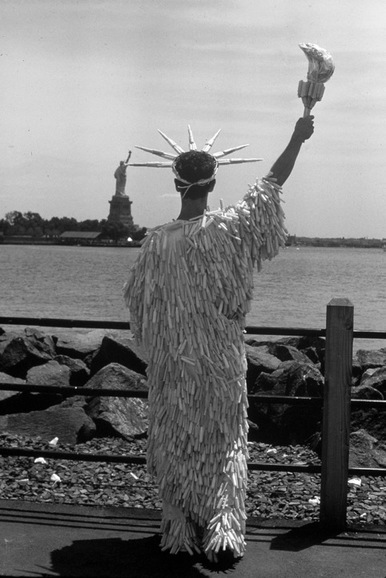
Tampon Applicator Creative Klubs International (TACKI) was established in 1985 to develop creative uses for discarded, non-biodegradable, plastic feminine hygiene products, commonly referred to as “beach whistles.”
TACKI President Jay Critchley launched his corporation in order to develop a global folk art movement and cottage industry, promote awareness of these elegant throwaway objects washed up on beaches worldwide from faulty sewage systems, create the world’s largest collection of discarded plastic tampon applicators, and ban their manufacture and sale through legislative action.
The mission’s global ambassador is Miss Tampon Liberty, aka Jay Critchley, who wears a gown of 3,000 beach whistles when taking her message to: the Massachusetts State Legislature; Liberty State Park for the Centennial of the Statue of Liberty; the No With The Flow protest of the Boston Sewage Outfall Pipe; and numerous site-specific performances and installations.
Miss Tampon Liberty was also featured in the documentary Under Wraps, screened at the Margaret Mead Film Festival at the American Museum of Natural History in New York.
NO WITH THE FLOW
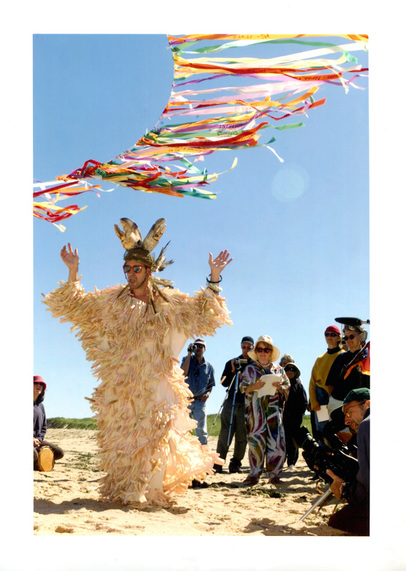
No with the Flow, was a ceremony/protest to mark the opening of the 9.5 mile Boston Sewage Out Fall Pipe into Massachusetts Bay, spewing 360,000,000 gallons of effluent per day into Provincetown Harbor.
Miss Tampon Liberty'_s_gown (circa 1985) is made of 3,000 “beach whistles”, mixed media. Performed at Race Point Beach, Cape Cod National Seashore, Provincetown, MA. The artist performed “I’m Miss Tampon Liberty,” with dance, 2000.
pilgrim TAMPONUMENT
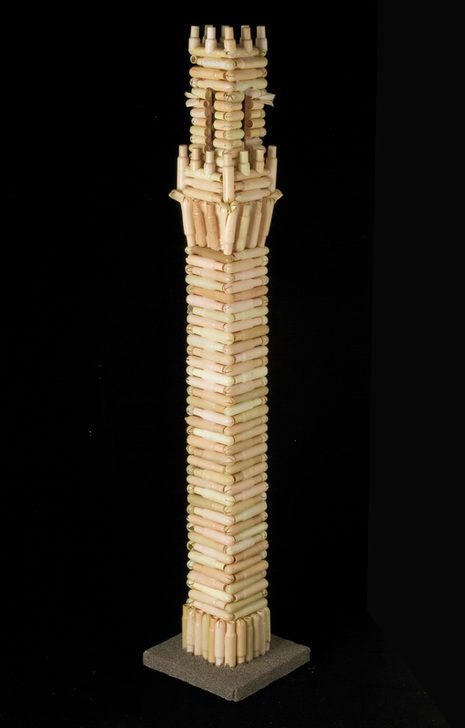
A fertile history. Twelve hundred cycles a century. The Provincetown Tamponument celebrates the 100th anniversary of the Provincetown Pilgrim Monument, dedicated in 1910 to commemorate the first landing place of the Pilgrims and the signing of the Mayflower Compact. The Tamponument, and the antique, centennial postcard on which it is featured, also commemorates the 25th anniversary of TACKI (Tampon Applicators Creative Klubs International).
“The Pilgrims were not the first visitors to the Cape tip and they won’t be the last – as long as we have “beach whistles” visiting our shores. And they add a feminine touch to the festivities,” states artist Jay Critchley.
Formed in 1985 by TACKI President Critchley, who was alarmed by the volume of plastics in the marine environment, TACKI sponsored legislation in Boston to ban the manufacture and sale of these non-biodegradable “feminine hygiene products” washed up on Cape Cod beaches. The artist also created numerous sculptures and installations, including TACKITOWN, as well as performance pieces, one wearing his Miss Tampon Liberty gown, fashioned from 3,000 beach whistles, at Liberty State Park for the Statue of Liberty Centennial in 1986.
The Tamponument postcard is modeled after one from the antique postcard collection of Dan Towler.
In 1985, Critchley was the only one in Provincetown to commemorate the Monument’s 75th anniversary by burying memorabilia in a plastic tampon applicator time capsule, wrapped in fish skins, at the foot of the all granite structure.
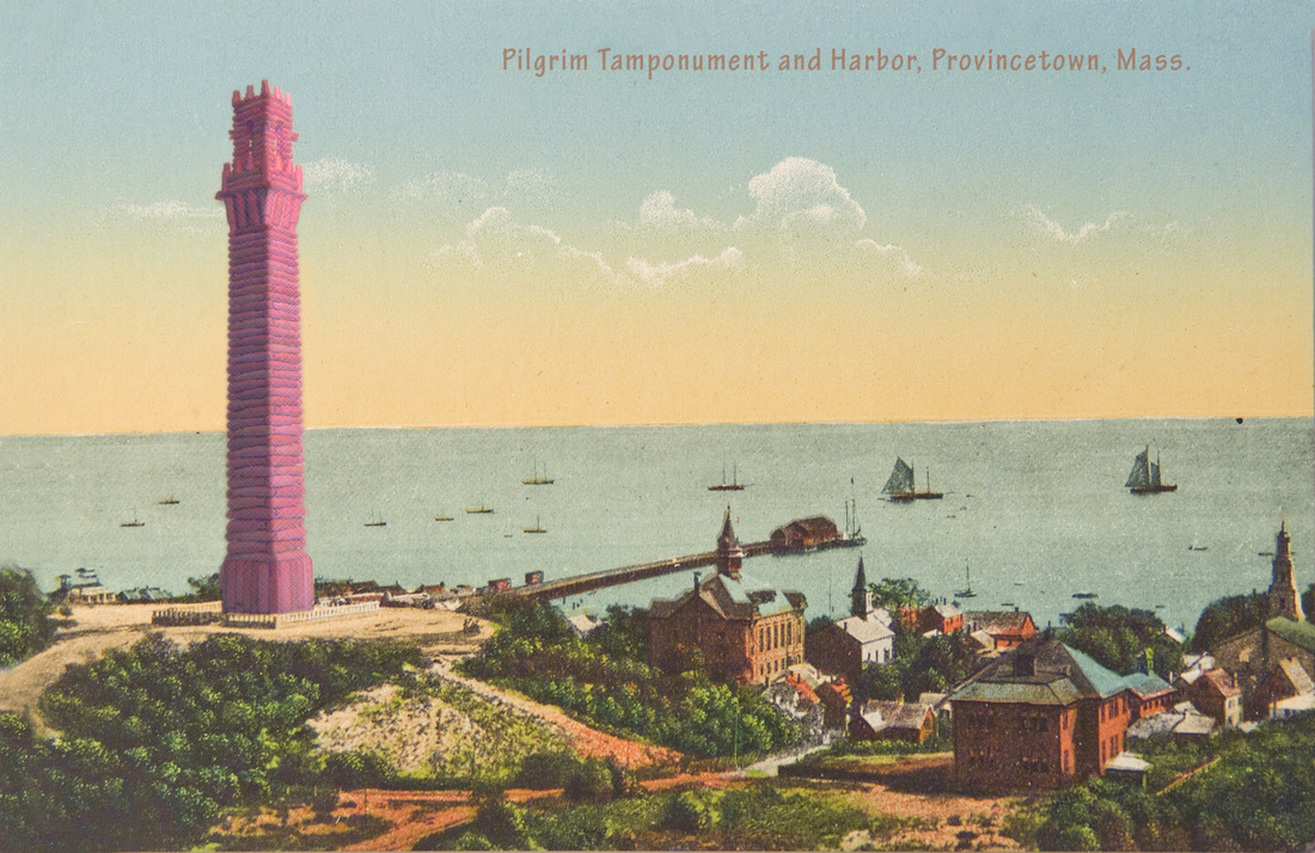
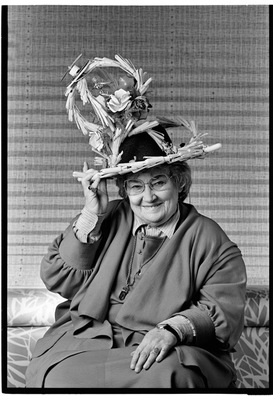 |
Bella Abzug **“Bella Abzug Modeling Tampon Applicator Hat” made by Jay Critchley, circa 1992. Photo Credit: Chris McCallan, 2009.**Environmental activists and artist Jay Critchley was commissioned by Adrienne Scott and Liz Armstrong, Canadian menstrual activists (and authors of the 1992 book Whitewash: exposing the health and environmental dangers of women’s sanitary products and disposable diapers : What you can do about it) to create this amazing hat to generate awareness about the tremendous waste produced by single use FemCare products (they also fashioned a menstrual pad costume (with wings!) and wore it during protests). Kudos to the legendary Bella Abzug for agreeing to model it in this photo shoot! |
|---|
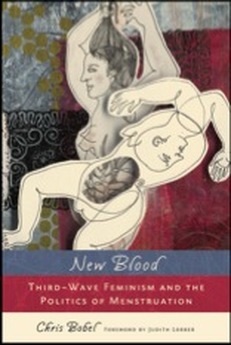
Chris Bobel’s book on menstruation features Miss Tampon Liberty image
New Blood offers a fresh interdisciplinary look at feminism-in-flux. For over three decades, menstrual activists have questioned the safety and necessity of feminine care products while contesting menstruation as a deeply entrenched taboo. Chris Bobel shows how a little-known yet enduring force in the feminist health, environmental, and consumer rights movements lays bare tensions between second- and third-wave feminisms and reveals a complicated story of continuity and change within the women’s movement.
Through her critical ethnographic lens, Bobel focuses on debates central to feminist thought (including the utility of the category “gender”) and challenges to building an inclusive feminist movement. Filled with personal narratives, playful visuals, and original humor, New Blood reveals middle-aged progressives communing in Red Tents, urban punks and artists “culture jamming” commercial menstrual products in their zines and sketch comedy, queer anarchists practicing DIY health care, African American health educators espousing “holistic womb health,” and hopeful mothers refusing to pass on the shame to their pubescent daughters. With verve and conviction, Bobel illuminates today’s feminism-on-the-ground—indisputably vibrant, contentious, and ever-dynamic.